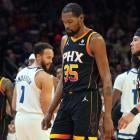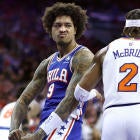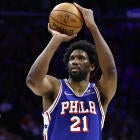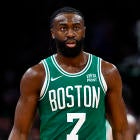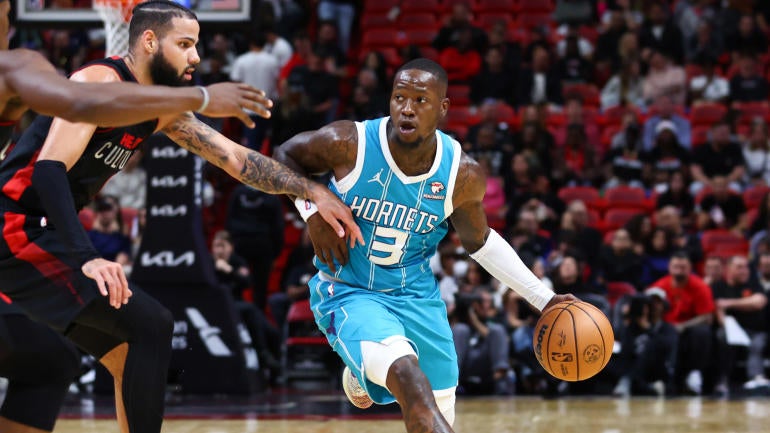
The Miami Heat got themselves some more firepower on Tuesday, acquiring guard Terry Rozier from the Charlotte Hornets in exchange for guard Kyle Lowry and a 2027 first-round pick. Rozier, who turns 30 in March, is having a career year and will be expected to give the NBA's 20th-ranked offense a boost. The pick going to the Hornets is lottery-protected in 2027 and unprotected in 2028, according to ESPN's Adrian Wojnarowski.
Lowry, who turns 37 in March, is on a $29.7 million expiring contract and doesn't have much of a future with a Charlotte team that is 10-31 this season. The Hornets will try to trade him before the deadline, rather than immediately working on a buyout, according to ESPN.
Let's grade the trade.
Heat: A-
You can't quibble with this trade in terms of value. Miami, a team that made the NBA Finals last season, turned a veteran on an expiring deal into a guy who's averaging 23.2 points and 6.6 assists with a 57.4% true shooting percentage on a difficult shot diet. It cost the Heat a future first-rounder, but it's not fully unprotected and, if they see themselves as a contender, this sort of thing is what future firsts are for. Rozier is in Year 2 of a four-year, $96.3 million contract; he'll be 32 and making $26.6 million in 2025-26, the last year of his deal.
The upside here is straightforward: Miami needs offense, and Rozier can provide it. He doesn't need to dominate the ball, but he can initiate offense and relieve Jimmy Butler, Bam Adebayo and Tyler Herro of playmaking responsibility. This season, Rozier is making 39.3% of his pull-up 3s and, according to Cleaning the Glass, making a career-high 50% of his midrange shots, including 51% on long 2s. He gives Miami another player who can hunt mismatches and get buckets when opposing teams are switching and the halfcourt offense is getting bogged down.
Ideally, Rozier will make a smooth transition into a less demanding offensive role. With numerous playmakers next to him, he should not have to take as many tough 2s as he's been taking in Charlotte. Rozier's usage rate this season is 26.8%, and according, to pbpstats.com, it was 28.4% in 873 minutes without LaMelo Ball on the court. Butler (24.3% usage rate), Adebayo (27%) and Herro (28%) will create more opportunities for Rozier to either catch and shoot -- he's only made 29.9% of his catch-and-shoot-3s this season, but his volume (2.9 attempts per game) is lower than it has been since he was a backup in Boston -- or attack a tilted defense.
The Heat need Rozier to bring the best parts of the guy he's been for the Hornets lately and the guy he was with the Celtics years ago. As long as he can get comfortable in their offense, he'll be more efficient than ever. Erik Spoelstra will surely have him in motion off the ball, setting ghost screens and coming off dribble-handoffs. Given how well Duncan Robinson and former Miami wing Max Strus played off of Adebayo, the big man should be able to establish a two-man game with Rozier right away. The Heat will also demand that Rozier use his length (he's 6-foot-1 with a 6-8 wingspan) on defense, navigate screens and generally be as much of a pest as possible.
Also worth noting: Miami will save $15.4 million in luxury-tax payments this season because of the swap, and it will create a $6.4 million trade exception, per ESPN's Bobby Marks.
If you aren't bullish on this move, it might be because you doubt that Rozier can or will do all that. He hasn't played for an above-average defense since he left Boston, and, according to Cleaning The Glass, the Hornets have been worse on that end with him on the court every year but one. Lowry isn't the defender that he was in his prime, but his smarts haven't gone anywhere, he remains one of the league's best charge-takers and he's still sturdy when switched onto bigger players. Spoelstra will miss his screening and the way he pushes the pace, too.
There's also the opportunity cost. Trading the pick doesn't necessarily make it impossible for the Heat to acquire a star player in the near future, but it certainly makes it more difficult before this year's deadline, particularly if their delightful rookie, Jaime Jaquez Jr., is assumed to be untouchable. (Miami now can only trade one unprotected first-rounder: Its 2030 pick.) Does this deal move the needle enough to justify missing out on something bigger? Miami's offense hasn't been awesome, but how much of that is simply a result of injuries? Herro and Rozier are fairly similar offensively, and Rozier's presence might complicate Jaquez's growth and Robinson's playing time.
Mitigating all that, though, is Rozier's contract. Since the Heat didn't go out and get someone like the Chicago Bulls' Zach LaVine, who is owed $49 million in 2026-27, this doesn't feel desperate. As long as Rozier plays well, he should have trade value next offseason and beyond. He could even be included in an eventual trade for a star. If Miami determined that it was unlikely to use Lowry's contract and this pick to trade for a star in the next 16 days, then a move like this is the next best thing.
Hornets: A
It's not that Charlotte "won" the trade. It just gets the slightly higher grade because its situation is simpler. The Hornets are halfway through a dark, forgettable season, and it's time to get what they can for the players who aren't a part of their future. They're not done making future-focused moves, according to ESPN, and no one will be surprised if Miles Bridges and Gordon Hayward, both of whom are on expiring contracts, are elsewhere soon. It's reasonable to wonder if the Hornets might move PJ Washington, who signed a team-friendly contract last offseason, too.
Charlotte was probably never going to get a valuable young player for Rozier, and it didn't manage to get a fully unprotected first-round pick way into the future. It got a pretty good one, though, particularly if it doesn't convey in 2027. Butler is 34, and if the Heat happen to miss the playoffs in 2026-27 and have a down season in 2027-28, the Hornets will look brilliant.
(An aside that you should skip if you don't care about dorky NBA minutiae: Since Miami owes the Oklahoma City Thunder a lottery-protected first-round pick in 2025, if it misses the playoffs next season, the pick in this trade will automatically become an unprotected 2028 first, due to the Stepien rule.)
When Charlotte acquired Rozier in a sign-and-trade as Kemba Walker left town, it was not met with rave reviews. His four-year extension wasn't exactly celebrated at the time, either. Rozier grew immensely as an offensive player in his four and a half years with the Hornets, though, and developed a reputation for hitting difficult shots in the clutch. In an alternate universe, the franchise might have been able to build on the promise it showed in Ball's first two seasons. In this universe, after a coaching change, some misfires in the draft, an ownership change and a ton of injuries and ugliness, it became clear that Rozier would not be part of the next Charlotte team to make the playoffs, which means trading him for a first-round pick is a win.
It is within the realm of possibility that the Hornets still get more out of this deal. Lowry is a prime buyout candidate, but, due to the restrictions in the NBA's new collective bargaining agreement, he can't sign with the Denver Nuggets, Golden State Warriors, Los Angeles Clippers, Milwaukee Bucks, Phoenix Suns or the Celtics. If one of those teams would like to acquire him, it would have to trade for him.
Even if Lowry is eventually bought out, though, this move makes sense for Charlotte, whose front office is projected to have more than $45 million of cap space this offseason. Now let's see who follows Rozier out the door.















